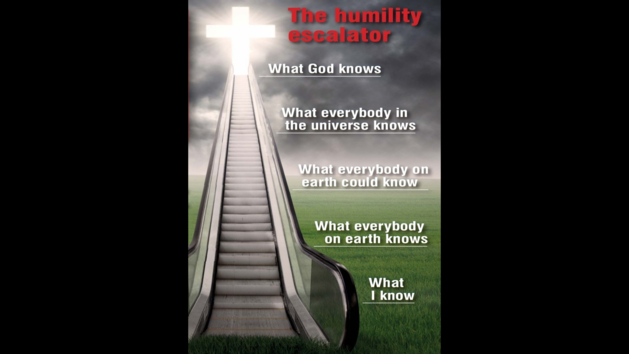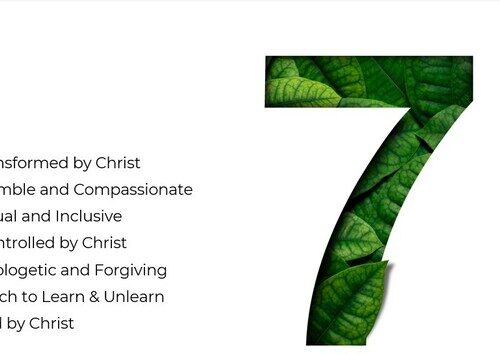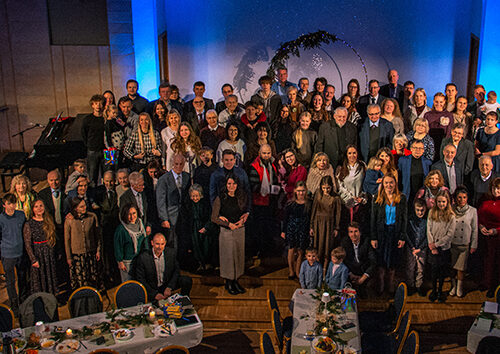25 February 2025 | St Albans, UK [David Neal]
In the second of this series for tedNEWS about Character Driven Leaders, we consider how compassion and humility are key qualities of Christian leadership.
There is something in all of us that wants to be ‘king’ – and have all the power that comes with it. It’s called ‘ego’, which the singer Frank Sinatra heartily embraced in his signature song, ‘I Did It My Way’.
The end of ‘top-down leadership’
There was a time, not so long ago, when power and leadership structures were ‘top-down’ in civil society, in industry, and even in the church. For example, it was not uncommon for pastors to receive instruction (an order) to relocate to another district at their president’s word without question or consultation. Not to accede to the request was a negative mark on their employment record. And the same was often the case for numerous professions. In the factory and in the office, it was customary for the bosses to enjoy the privilege of position – with perks. While they enjoyed the comfort, luxury, and exclusivity of the director’s dining room, the workers ate in the austere surroundings of the staff canteen.
Robert K. Greenleaf in his 1970 essay turned on its head the traditional leadership order by creating the distinction between ‘leader first’ and ‘servant leader’. His revolutionary thinking demolished the idea that leaders are primarily appointed to lead for the benefit of themselves. The reward, in his worldview, was to experience ‘the natural feeling that one wants to serve… The difference manifests itself in the care taken by the servant-first to make sure that other people’s highest priority needs are being served.’ (1)

The problem of our humanity
Sharing power, putting the needs of others first, and championing their success have slowly become the paradigm of our time. But we must admit that it is more evident in some places and societies than others. The old habit of ‘top-down’ leadership has not been entirely eradicated from our leadership DNA. Nor is the ‘survival of the fittest’ leadership, constantly in a race to reach the top.
Perhaps at the core of the problem is our humanity and the selfish gene that refuses to go away. Put another way, it is a human need to be recognised – which leadership affirms. Our ego is fed with the rewards that leadership often offers; greater responsibility, power, influence – and, of course, renumeration. As these rewards feed, comfort and affirm our ego, a sense of pride wells up. We have achieved. We are a success. There must be something very right about us.
‘Not so fast,’ says the philosopher Socrates, because ‘humility is the greatest of all virtues.’ Arguing his case more than 2,000 years ago, he believed that “the wisest people are the first to admit how little they really know.” And here’s the key for today’s leaders, and why ‘servant-leadership’ is so critical: “People with greater humility are better learners, decision-makers and problem-solvers.”(2)

Compassionate leadership – challenged to its limit
As 2025 began, the traditional post-war international rules-based order unravelled, forcing political leaders across global regions to reassess their political and economic strategies in light of a new world order. “We have entered”, says the former head of the UK MI6, Sir Alex Younger, “a rules-free amoral world order in which the only commodity that matters is raw power. (3)
Among the first casualties of this deconstruction was the intrinsic value and dignity of the individual, that “every single life, even the shortest life, has a purpose and that every single person is irreplaceable.” (4)

In addition, we see the growing ‘transactional’ leadership character of both political and tech oligarchs – and compassion-driven leadership is off the agenda. This kind of transactional leadership is supported by a 2025 re-interpretation of the parable of the Good Samaritan (Luke 10:25-37), driven by the question, “And who is my neighbour?” The new explanation reads like this: “You love your family, and then you love your neighbour, and then you love your community, and then you love your fellow citizens and your own country, and after that, then you can focus and prioritize the rest of the world.” (5)
Need for compassion is greater than ever
Sydney Carter’s 1965 song When I Needed a Neighbour poses the simple yet profound question, “Were you there?”—a call for compassion. As one commentator noted, “While Carter’s plea for love and understanding amongst people has always been relevant – what subject could be more so? – there is also the paradox that at that unique time and place we are wont to call ‘now,’ the need for compassion has always seemed greater than ever.”
Character-driven leaders with compassionate hearts? “But he’s already made it plain how to live, what to do, what God is looking for in men and women. It’s quite simple: Do what is fair and just to your neighbour, be compassionate and loyal in your love, and don’t take yourself too seriously—take God seriously.” (Micah 6:8 The Message)
Reflection is key
Is smart leadership’s secret found in cognitive reflection? David Robson suggests so, citing former German Chancellor Angela Merkel. He attributes her thoughtful decision-making to her scientific background, which fosters listening before concluding. UK leadership coach Khalid Aziz adds, “You need confidence to be humble”—a paradox that defines servant leadership. (6)

Don’t lose sight of the key to leadership excellence, when we recall to mind a woman called Mary, who lived servant-leadership long before Robert K. Greenleaf raised the idea. Supernaturally informed that she was to give birth to the Christ-child, conceived by the Holy Spirit – in that moment of crisis, she could have emotionally collapsed. On the other hand, the idea that she was carrying the future Messiah could quickly have gone to her head – she was the chosen one. Her cousin Elizabeth described her as “blessed… among women” because she was “the mother of my Lord” (Luke 1:42, 43).
Far from being a member of the great and the good, Mary’s origins were from the small village of Nazareth, near Galilee. Being the mother of the Messiah not only carried with it great privilege, but also great risk.
Most notable from Mary’s life for us today are the words Mary speaks for herself in Luke 1:46-55, described as ‘The Magnificat’, or ‘Mary’s Song’. It is a song of confidence in the workings of God, expressing obedience and devotion. It is a confidence she drew on continually as she mothered the Christ-child to adulthood – eventually standing at the foot of His cross as He was unjustly crucified.
I share again Khalid Aziz’s assessment on leadership:
“You need confidence to be humble.”
“He has brought down rulers from their thrones but has lifted up the humble.” (Luke 1:52 NIV)
References
- ‘What is servant leadership?’ https://www.greenleaf.org/what-is-servant-leadership/
- David Robson, ‘Is this the secret of smart leadership?’ https://www.bbc.co.uk/worklife/article/20200528-is-this-the-secret-of-smart-leadership
- Quoted by Paul Vally, Church Times, 21 February 2025.
- Former UK Prime Minister Gordon Brown in his Jonathan Sax memorial speech, 27 March 2024.
- https://apnews.com/article/jd-vance-catholic-theology-migration-e868af574fb2e742c6ed3d756c569769
- ‘What is servant leadership?’ https://www.greenleaf.org/what-is-servant-leadership/
For further study: Developing A Compassion Mindset, Eric Carter
The Nebuchadnezzar Syndrome, Laurence Turner.
Part 1: Character-Driven Leaders – More Nightingale Please
Featured image: Maria Ćirin
Photos: Shutterstock. Good Samaritan (AI origin). Humility Escalator, David Bell.
Adapted for tedNEWS, this article was first published in “Today’s Leader 50 Timeless Leadership Principles”, a collaborative work by David Neal, Don W. McFarlane, and Josney Rodriguez that considers the ageless principles of leadership that the twenty-first century may have forgotten. Published by Stanborough Press, the book is available through Life Source Christian Bookshop from 1 March 2025.



